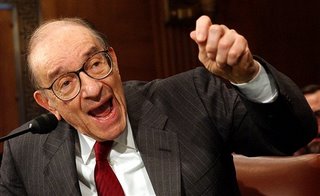
As most of you know, I'm no fan of Greenspan and I have questioned his motivations for years. Artificially supressing rates for as long as he did and helping to cultivate the biggest bubble in the history of mankind is nothing to be proud of. Now that his retirement speaking circuit is in full swing and he isn't obliged to "sugar coat" the truth, he's a little more liberal on his opinions with respect to the housing market. While he hasn't called for a crash, he certainly sees the inherent risks if the housing market implodes.
This is what Greenspan said in August, 2005:
Thus, this vast increase in the market value of asset claims is in part the indirect result of investors accepting lower compensation for risk. Such an increase in market value is too often viewed by market participants as structural and permanent. To some extent, those higher values may be reflecting the increased flexibility and resilience of our economy. But what they perceive as newly abundant liquidity can readily disappear.
Any onset of increased investor caution elevates risk premiums and, as a consequence, lowers asset values and promotes the liquidation of the debt that supported higher asset prices. This is the reason that history has not dealt kindly with the aftermath of protracted periods of low risk premiums.
Translation: The part is almost over and it could get ugly.
This is what Greenspan said yesterday:
Former Federal Reserve Chairman Alan Greenspan said Thursday that Americans' consumption could taper off somewhat now that the U.S. housing market's "extraordinary boom" has ended.
Greenspan, in his first public U.S. speech since retiring in January from a storied tenure leading the Fed, predicted there is no danger of a total collapse of the housing market.
"This has been quite an extraordinary boom," Greenspan said in remarks at the Bond Market Association's 30th anniversary dinner in New York. "Home sales are off, applications are off, everything is going in the same direction. The boom is over, and you can say that with a fairly strong degree of confidence."
Greenspan said he doesn't see home prices falling on a national basis, but instead in certain areas of the country. He warned reduced access of Americans to equity loan extraction would have an economic impact, which has had an "important effect" in stimulating the economy.
Translation: Run for your lives!
I'm exaggerating, of course. However, when a former Fed Chairman needs to reassure the public that there is "no danger of a total collapse of the housing market", the fact that he is even considering this point, should be a red flag for investors.